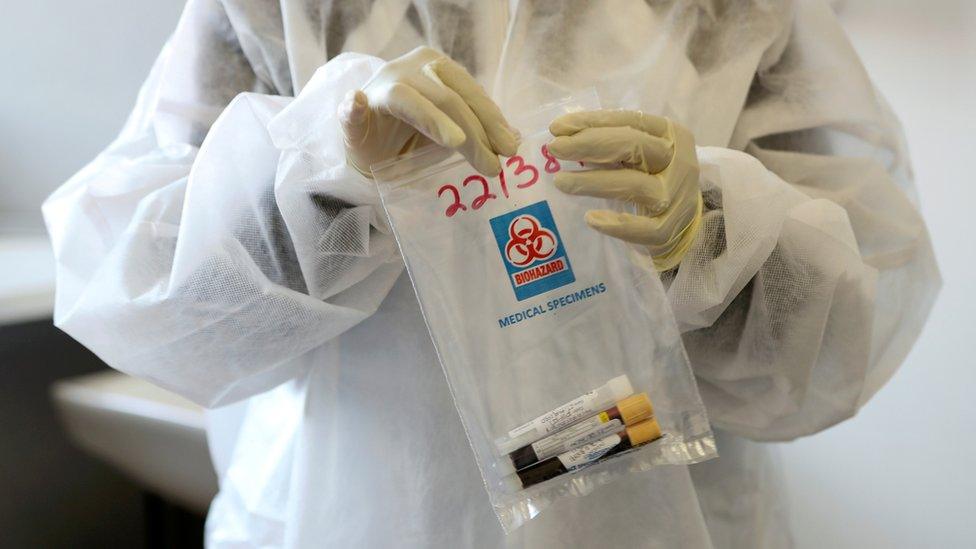Covid: Ten South African coronavirus variant cases in Wales
- Published
- comments
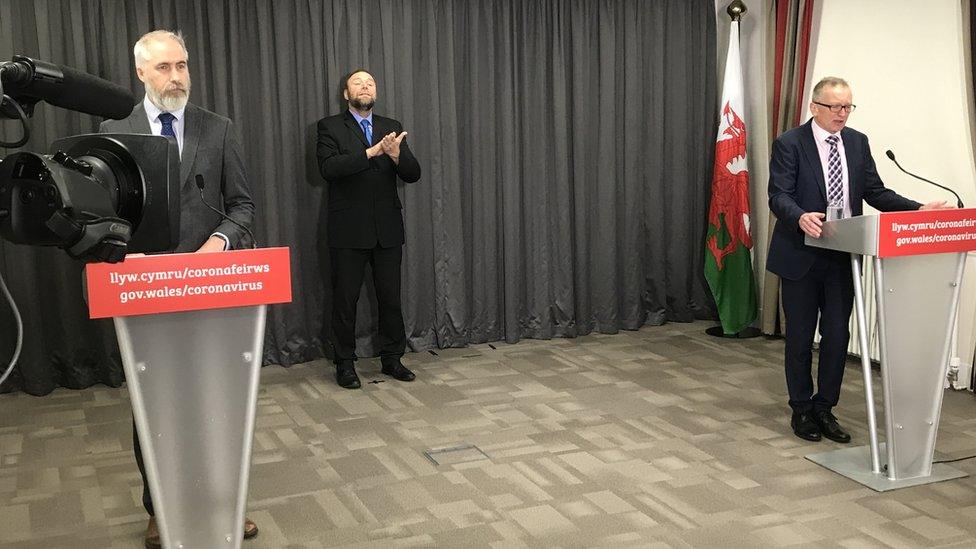
Three variants of Covid-19 are being monitored from South Africa and Brazil, say Wales' chief medical experts
There have been 10 cases of the South African coronavirus variant identified in Wales, a senior official has said.
Wales' Chief Scientific Adviser Dr Rob Orford said all had been cases recorded in people who had travelled abroad.
There are concerns vaccines may not work as well against the variant.
It comes as Prime Minister Boris Johnson announced that UK nationals and residents returning from a 'red list' of Covid hotspots will have to quarantine in a hotel.
The Welsh Government says the move does not go far enough.
At least 77 cases of the South Africa variant have been identified in the UK.
Meanwhile the overall seven-day coronavirus case rate has fallen in Wales to 203.8 cases for every 100,000 individuals - down from 650 before Christmas.
It is the lowest point since late November.
What do the latest figures tell us?
Watch how some of the hardest-hit areas in south Wales for Covid-19 cases have shown a recent improvement.
Covid-19 case rates in south Wales in particular have been showing improvements in the last couple of weeks, as lockdown restrictions appear to be having an effect.
Public Health Wales said it was confident there was a "consistent downward" trend, although numbers were still high and putting pressures on hospitals.
The south Wales valleys, Bridgend and Neath Port Talbot have perhaps seen the most dramatic reductions.
These include areas which recorded the highest case rates in the UK before Christmas.
Merthyr Tydfil continues to fall from a peak of 1,349 cases per 100,000 and the UK's highest a week before Christmas. It now has less than 200 cases per 100,000 for the first time since September.
There has been a large fall in case rates in Blaenau Gwent as well - from 1,020 cases per 100,000 in mid-December to its lowest rate since early October.
There are also encouraging signs in Rhondda Cynon Taf (RCT), where the case rate has dropped below 200 per 100,000 - also its lowest point since September.
In Bridgend, the case rate peaked just before Wales was put into a pre-Christmas lockdown on 18 December.
But it has fallen back sharply and is just under 226 cases per 100,000 for the first time since the end of November. Its positivity rate has also dropped to below 17%.
Similar patterns can be seen in Neath Port Talbot (NPT) - at its lowest point for case rates since mid-October.
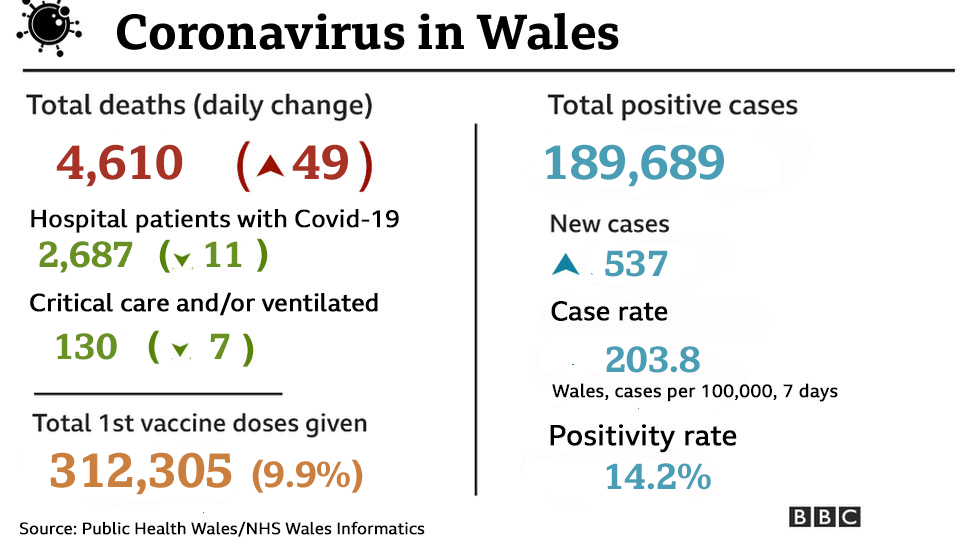
Despite the figures, Chief Medical Officer Frank Atherton said his current advice is that the headroom to relax restrictions is "really quite limited".
"The emergence of these new variants pose new challenges for us," added Dr Orford at Wednesday's Welsh Government coronavirus briefing, "because of their potential to alter the course of the pandemic".
"The concern is that a new variant will emerge that won't respond to treatment and vaccines, putting us back to where we began."
Three variants from South Africa and Brazil are being monitored, he said.
The Kent strain - which was identified in the UK and is thought to be more contagious - is the dominant strain across Wales, Dr Orford said.
Prime Minister Boris Johnson had said that early evidence suggested it may be more deadly.
Dr Orford did not refer to the prime minister, but he said three studies looking at death rates had "not been able to say that definitively".
He also said the Kent variant does not appear to have more impact on young and healthy people.
"It doesn't seem to have any difference in the way it infects people across the ages, which is really positive", he said.
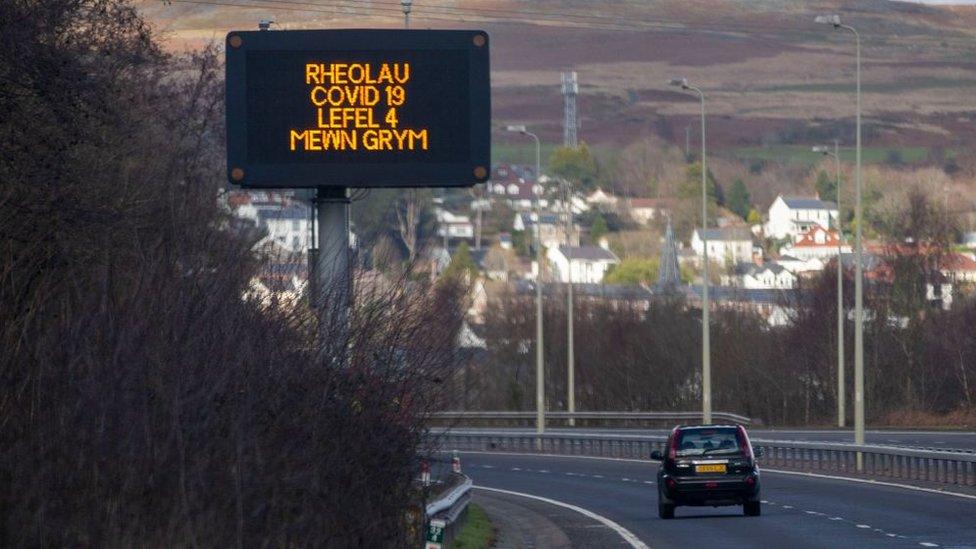
Wales is currently in a alert level 4 'stay-at-home' lockdown
Dr Atherton said it is believed that the R number - the rate that coronavirus reproduces - is below 1 - between 0.7 and 0.9.
He said that means the size of the current outbreak is "shrinking rather than growing", but he said rates were still "way too high".
First Minister Mark Drakeford is expected to announce the outcome of a 21-day review of lockdown restrictions on Friday.
But Dr Atherton said towards the end of February would be the "time to think about further relaxations".
"We will look again at where we are with community transmission, where we are with the NHS capacity and the business of the NHS, and where we are with vaccination," he said.
A total of 312,305 people have been given their first dose in Wales - 9.9% of the population.
Dr Atherton said the Welsh Government was on course to meet the target of vaccinating everyone in the four priority groups by mid-February.
The medical adviser said lessons had to be learned from how restrictions were eased before.
Dr Atherton added: "What I do say to the first minister and health minister is that we need to learn from what happened when we came out of previous lockdowns - the first lockdown in March, the firebreak in November.
"What we saw there was even though rates had come down quite well when we released things, we released them in a way which allowed the virus to re-establish itself very, very quickly."
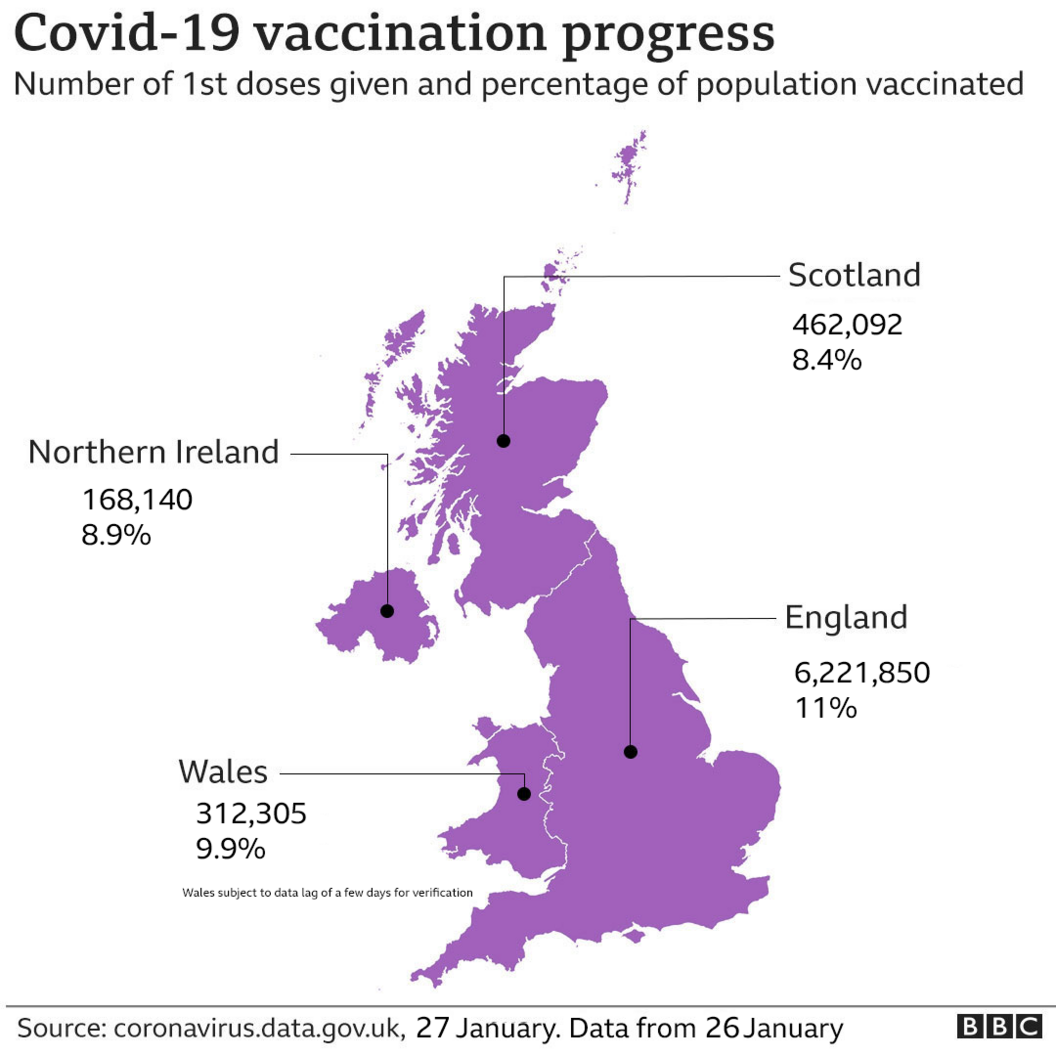


The encouraging news from the scientists is that lockdown is working and infection rates are steadily decreasing - so the sacrifices so many people are making are having an impact.
But Frank Atherton made clear he had told ministers, in advance of the latest lockdown review, that there was little room for manoeuvre.
Why? First, although the position is much better now than in the spring, infection rates, and positivity rates are still too high.
The other big issue is the prevalence of variants. The so called Kent-variant is now dominant across most of Wales, it spreads more easily.
Also 10 cases of the South African variant have been confirmed here, and that's a strain which is also causing a lot of concern internationally.
The fear is if restrictions are eased too quickly the presence of these variants could make it even more likely that infection could spiral out of control.

Asked whether he regretted any of the advise he had given in light of the milestone of 100,000 deaths across the UK, the chief medical officer said: "It took a while for us to learn about the virus."
Dr Atherton said different decisions would have been made on protecting care home residents earlier in the pandemic had it been known Covid-19 behaved very differently from flu.
But he said he did not think it "was a mistake" but was the "limits of what we knew".
"We started off treating it rather as we treated pandemic flu," he said.
"This virus has behaved very differently," he said. "I think, had we known that, we would have made some different decisions about, you know, looking after people in care homes."
- Published24 January 2021
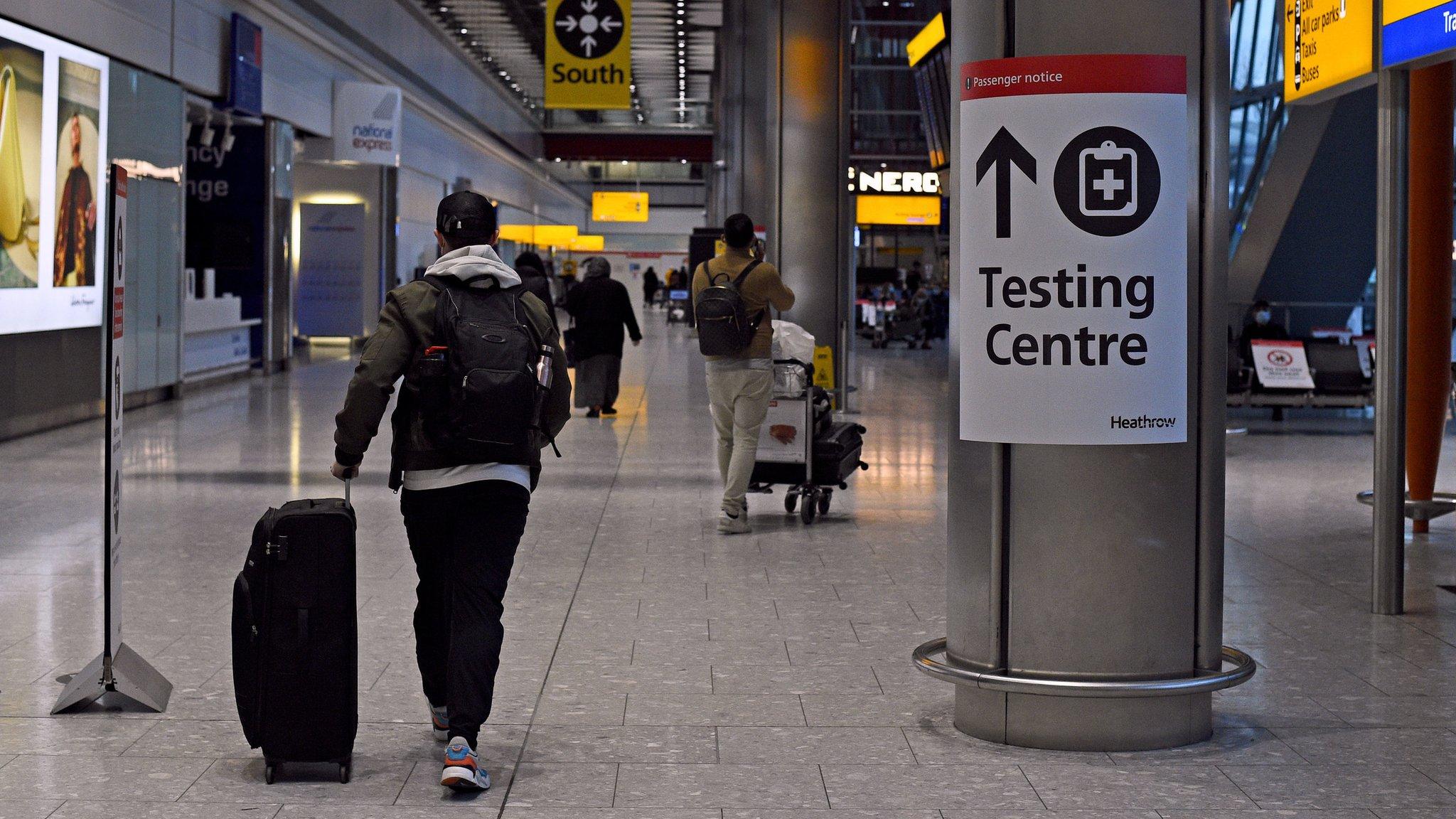
- Published29 July 2021
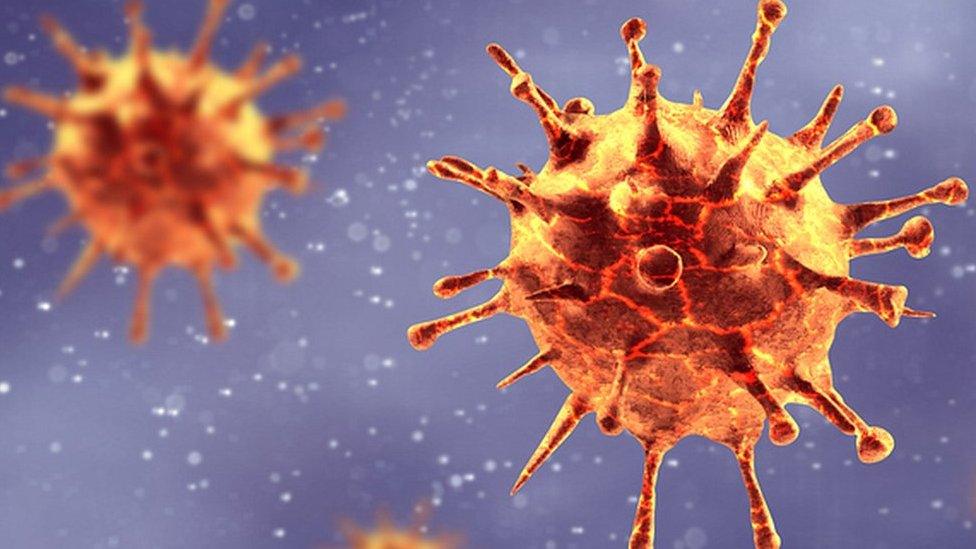
- Published4 January 2021
